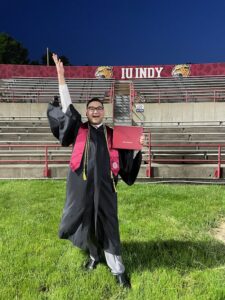
Part of the IU-Indianapolis Class of 2025, Pre-Med and Biology Major Connor Phutawon Earned a Theatre Certificate That Merged Both His Life-Long Passions in Hopes of Infusing Theatre Practice into His Career as a Future Pediatrician.
A 22 year old native of Crown Point who attended Crown-Point High School, recent graduate CONNOR PHUTAWON takes some time to reflect on his experiences at Indiana University-Indianapolis and the significance of his Theatre Certificate in complementing his educational and career goals.
As you reflect on your four years on campus and in courses for the Theatre Certificate, what anecdotes, memories, or takeaways come immediately to mind? Why are these impactful or significant to you? One of my most impactful memories in the program was leading a creative dramatics workshop where I guided my classmates through physical explorations of time using the game “What Time Is It?” by Viola Spolin. It was the first time I fully stepped into a facilitator role, and I realized how powerful theatre can be as a tool for reflection and learning, not just performance. Another unforgettable experience was the process of creating a script for my independent study, blending theatre with my pre-medical interests. These moments showed me that theatre is not just about the stage, but about connection, empathy, and transformation. This program also helped me find my voice as both a creator and collaborator. The program created a space where I could explore, identity, and story tell in deeply meaningful ways.
How did your experiences with G300 Capstone this year shape and inform your perspectives on career paths in applied theatre, teaching artistry, and/or what you can do with your degree? How did these experiences impact you the most? My capstone completely reshaped how I thought about what theatre can be and how it can live outside of traditional performance spaces. Through researching and writing a play focused on pediatric healthcare, I explored how applied theatre can empower young patients by making their voices heard in clinical settings. It showed me that theatre isn’t just for entertainment, but it can be used as a healing, educational, and social justice tool. The most impactful part was realizing that I could pursue a future where I don’t have to choose between science and theatre; they can work together. This experience affirmed my desire to use creative practice in my career as a physician.
How are you planning to activate the skills you’ve learned in the Theatre Certificate in the next part of your artistic, career, and/or life journey? What comes next for you after graduation? What are your immediate plans? After graduation, I’m taking a gap year to work in healthcare and prepare for medical school, with the ultimate goal of becoming a pediatrician. I plan to carry the communication, facilitation, and storytelling skills I gained in the Theatre Certificate Program into every patient interaction I have. I’ve learned how to listen actively, respond with empathy, and adapt to the needs of different audiences, skills that are essential not only in theatre, but in medicine too. I also hope to continue writing and exploring projects at the intersection of art and health. Whether it’s using role-play to teach young patients about their diagnoses or helping medical teams better understand patient perspectives, I want to keep theatre in my toolkit. The certificate didn’t just make me a better performer, it made me a better future doctor.
What advice would you give to a prospective student entering the Theatre Certificate (or considering it)? What qualities and skills will help them succeed and get the most out of what this curriculum and credential has to offer? My advice to any prospective student considering the Theatre Certificate is: Be open to growth in unexpected ways. You don’t need to be a theatre major to thrive in this program. You just need to be curious, collaborative, and willing to challenge yourself. This certificate will stretch you creatively and intellectually, whether you’re performing, designing, or leading workshops. Lean into the interdisciplinary nature of the coursework, because you’ll learn skills that transfer to any field from teaching to healthcare to business. The faculty are incredibly supportive and will help you shape your unique path. Most importantly, don’t be afraid to bring your full self into the space. Theatre is about truth-telling, and this program gives you a platform to explore your voice and purpose.
TO LEARN MORE ABOUT IU – INDIANAPOLIS’ THEATRE CERTIFICATE PROGRAM and REQUIREMENTS, VISIT:
https://academics.iu.edu/degrees/indianapolis/certificate-in-theatre.html

